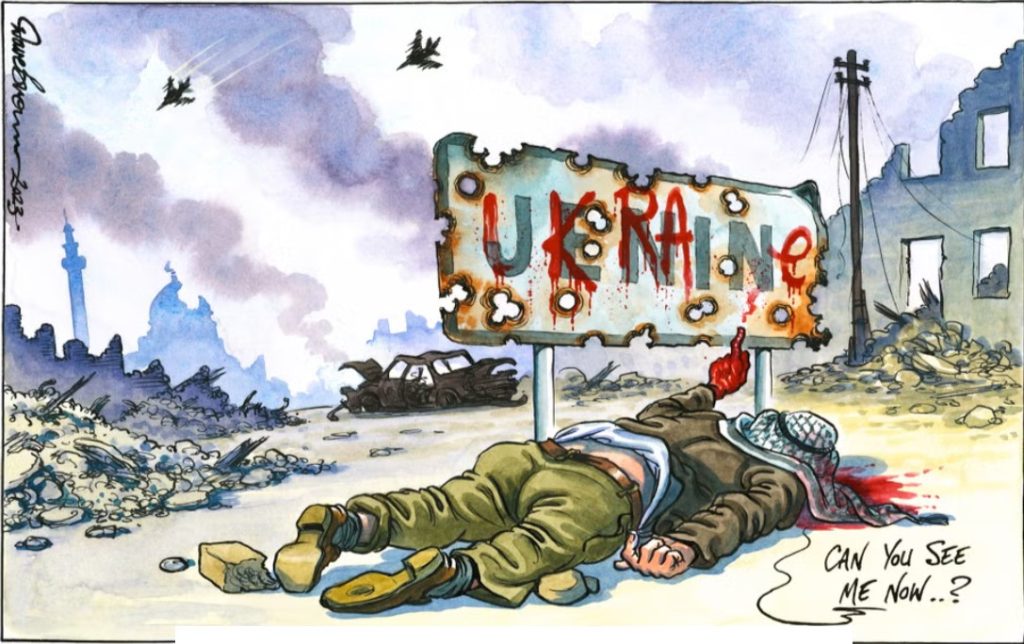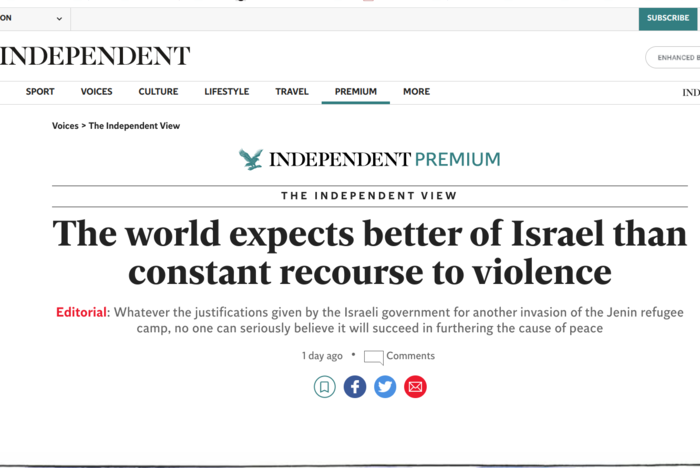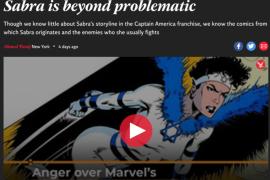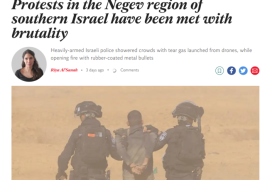Israel is “stubborn”, “vengeful”, and engages in “unremitting inhumanity”, according to an editorial at the Independent – but evidently written on behalf of the entire world (“The world expects better of Israel than constant recourse to violence“, July 4).
The piece is illustrated by one of the most morally obtuse and intellectually dishonest political cartoons related to the conflict that we’ve come across. It compares Russia’s unprovoked war against Ukraine, in which over 9,000 civilians have been killed, to the IDF’s two-day military operation in Jenin to erode the capacity of proscribed terrorist groups to launch attacks on Israeli civilians.

The Indy editorial begins with an egregious mischaracterisation of the military operation and a cliche:
If brutal military operations by the Israel Defence Forces (IDF) in Palestinian settlements [sic] were sufficient to end the conflict in the region, then the Middle East would have been at peace for decades. Plainly, it has not been – and equally obviously, violence is begetting violence, as it always has.
Far from “brutal”, in two days of fighting in the densely packed terror 12 Palestinians were killed – at least 10 of whom, and maybe all, were identified as either terrorists or males involved in violent clashes.
Further, the “violence only begets violence” cliche, in the context of Jenin, would suggest that there was a non-military solution to destroy bomb-making factories, seize weapons and arrest terrorists affiliated with groups, backed and armed by Iran, proscribed by the UK and much of the West – a peaceful alternative that Israeli leaders, in their thirst for violence, refused to consider.
The editorial later acknowledges “There have been many deadly attacks by Palestinian groups on Israeli settlers”, while omitting the fact that not all of the deadly attacks targeted Israelis living across the Green Line. It also notes that “some [in Jenin] deny Israel’s right to exist in peace”.
However, it then goes on to impute the worst possible motives for the Israeli operation:
In essence, the IDF operation in Jenin was a punitive, retributive exercise, and one that is sure to escalate tensions. The town of Jenin hosts a refugee camp that dates back to 1948, and is thus both a symbol and a cause of grievance. It was a centre for violence in the second intifada, which ended in 2002 [sic].
First, the town of Jenin “hosts” a community that’s administered by UNRWA, the UN body which bestows “refugee” status to Palestinians, all but a tiny number of whom aren’t actual refugees from 1948, and, contrary to all other refugees, is a status passed along to every subsequent generation of Palestinians – premised on the grievance-inspiring fiction that they will all one day ‘return’ to Israel.
In fact, a good question, considering UNRWA’s role in Jenin, is how the organisation allowed it to become a nest of terrorism. In addition to its role as the incubator of the current terror campaign against Israeli civilians, a staggering 45% of the camp’s residents are believed to be affiliated with terror groups.
The fact that the IDF found bomb-making facilities, weapon caches (including one under a mosque) and terror operations center found upon entering Jenin – a fact alluded to later in the editorial – is evidence that the Israeli operation was not “punitive” or “retributive”, but, rather, preventative – the equivalent of defusing a ticking time bomb.
Remarkably, while Israel is lectured on the need to refrain from such ‘provocative’ incursions, pursue two-states and behave more ‘humanely’, there is nothing in the lengthy editorial even suggesting that Palestinians have any role whatsoever to play in resolving the conflict. There isn’t a word about the radical ideology that animates terror movements in Jenin and throughout the West Bank.
Instead, the violence they engage in is attributed to “despair” over settlements and the failure to achieve two states – as if the thousands of Palestinians who’ve sworn allegiance to antisemitic extremist groups like PIJ spend whatever down time they have in between coordinating attacks against Jews scouring the archives to glean insight into what went wrong with previous negotiations and brainstorming on innovative ways to re-start the peace process.
The Indy editorial is another illustration of what Shany Mor referred to as the media dynamic of re-framing Palestinian pathologies as legitimate grievances, as long, of course, as they’re directed against the right people.
Related Posts
Guardian: Israeli resistance to Palestinian extremism is futile





